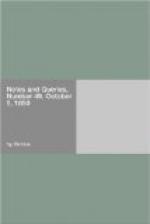It may be rightly stated that the high spiritual rank of the bishops is a reason for giving them precedence over the temporal lords sitting as barons; but has that reason been assigned by any writer of authority, or even any writer upon precedence?—the Query suggested by E. (Vol. ii., p. 9.) Lord Coke does not assign that reason, but says, because they hold their bishopricks of the king per baroniam. But the holding per baroniam, as before observed, would equally apply to the temporal lords holding lands by similar tenures, and sitting by writ, and receiving summons in ancient times in virtue of such their tenure.
The precedence of bishops over barons was clearly disputed in the reign of King Henry VI., when Baker says in his Chronicle (p. 204.), judgment was given for the lords temporal; but where the judgment, or any account of the dispute for precedence, is to be found I cannot say. That is what your correspondent G. inquired for (Vol. ii., p. 76.).
C.G.
Your correspondent ARUN (Vol. ii., p. 254.) states, on the authority of Stephen’s Blackstone, that—
“Bishops are temporal
barons, and sit in the House of Peers in
right of succession to certain
ancient baronies annexed or
supposed to be annexed to
their episcopal lands.”
This position, though supported by Lord Coke in more places than one (see Coke upon Littleton, 134. a, b; 3 Inst. 30.; 4 Inst. 44.), and adopted by most other legal text-writers on his authority, cannot, it is conceived, be supported. It seems to be clearly ascertained that bishops sat in the great councils of this and other kingdoms not ratione baroniarum but jure ecclesiarum, by custom, long before the tenure per baroniam was known. In the preambles to the laws of Ina (Wilkins’ Leges Ang.-Sax. f. 14.), of Athelstan (ib. 54.), of Edmund (ib. 72.), the bishops are mentioned along with others of the great council, whilst the tenure per baroniam was not known until after the Conquest. The truth seems to be that
“The bishops of the Conqueror’s age were entitled to sit in his councils by the general custom of Europe and by the common law of England, which the conquest did not overturn.”—Hallam’s Mid. Ag. 137-8, 9th ed.
Can any of your readers throw any light on the much disputed tenure per baroniam? What was its essential character, what its incidents, and in what way did it differ from the ordinary tenure in capite?
BARO.
* * * * *
REPLIES TO MINOR QUERIES.
Leicester and the reputed Poisoners of his Time (Vol. ii., pp. 9. 92.).—This subject receives interesting illustration in the Memoirs of Gervas Holles, who at some length describes the seduction of the Lady Sheffield, by Leicester, at Belvoir Castle, while attending the Queen on her Progress. A letter from the Earl to the lady of his love, contained the suspicious intimation—




